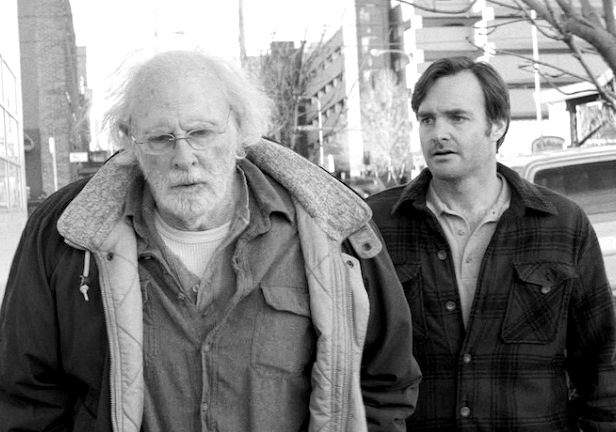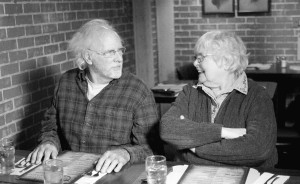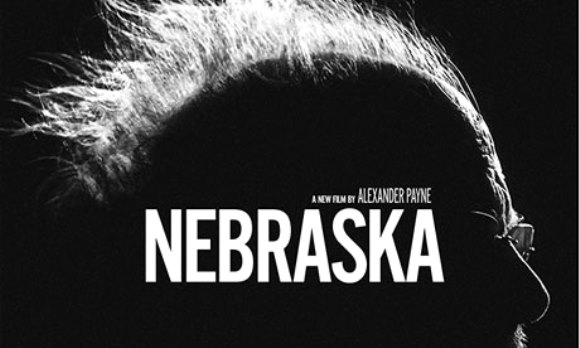
As amiable as it is it can sometimes be difficult to watch (patience needed!), but it has sincere quiet pleasures. The most obvious achievement of Alexander Payne’s Nebraska is the Ansel Adams desaturated style of high contrast black & white photography, but you have to put up with the dawdling and moseying pace of the film. I love Payne’s work, from “Election” to “The Descendants,” but this one is hard to fully love. Bruce Dern is immalleable as the emotionally detached and crotchety old man who wants to walk from Billings, Montana to Lincoln, Nebraska to pick up what he thinks is his $1 million dollar Publisher’s Sweepstakes prize money. As the son, Will Forte is the most awkward of comedians going into straight drama, and honestly, that makes him all the more interesting.
The white-haired and disheveled Dern is a lifelong alcoholic and unhappily married Woody Grant, and without a driver’s license he makes multiple attempts to walk out of state to claim his money. His nagging wife (the scene-stealer June Squibb) threatens to put him in a home, but is at the same time miserly about being alone. Forte is David, the son willing to drive him. He gets an earful from Mom and from brother Ross (Bob Odenkirk), who eventually join them on a separate trip. The long layover occurs in Hawthorne, Nebraska, mom and dad’s hometown where extended relatives reside.
What a bunch of lazy couch potatoes this family is. The family (and the whole town) hears about Woody’s million bucks, without hearing the origins of the contest or the validity of it, they became either infatuated with the big news or they want to stake a share out of it. David tells them in his low-key diplomatic way that there isn’t really any prize money, that Dad simply needs to carry out this fantasy right now. Woody drinks past his limits, says some stupid things, and finds it hard to move on with his quest.
We know the film will be something of a sell-out if there actually is a million dollars at the end. That would be too easy. “I didn’t even know they did these things anymore,” David scoffs, when he first sees the sweepstakes letter. Payne doesn’t deny us the scene where they show up at Publishing Sweepstakes headquarters, the scene is both pitiful and bittersweet. “Nebraska” has some subtle points to make, which is does so ever so humorously dry, but the most interesting element to me was observing David transition into a patient and understanding son. David, a passive loser stereo salesman at first sight, matures ever so slightly over the course of the journey and we suspect he might have just a tad fuller breadth of wisdom when he reaches his dad’s twilight age.
 I wasn’t moved to tears by “Nebraska.” I’ve seen the old man take the open road movie before, particularly with “Harry and Tonto” and most stirringly with “The Straight Story.” Squibb, like I said, gives a terrific performance as a wife who has convincingly spent her entire life belittling her husband. Even when there was something curious to think about, there was a part of me however that almost felt a little ho-hum about it. Almost. It is a nice, minor film yet it’s the first Payne release that doesn’t feel like all too much of a big deal except for the artistic reaches of the black & white.
I wasn’t moved to tears by “Nebraska.” I’ve seen the old man take the open road movie before, particularly with “Harry and Tonto” and most stirringly with “The Straight Story.” Squibb, like I said, gives a terrific performance as a wife who has convincingly spent her entire life belittling her husband. Even when there was something curious to think about, there was a part of me however that almost felt a little ho-hum about it. Almost. It is a nice, minor film yet it’s the first Payne release that doesn’t feel like all too much of a big deal except for the artistic reaches of the black & white.
110 Minutes. Rated R.
DRAMEDY / LIFE LESSONS / WEEKDAY FOOD FOR THOUGHT
Film Cousins: “Christmas in July” (1940); “Harry and Tonto” (1974); “Stranger Than Paradise” (1984); “The Straight Story” (1999).





